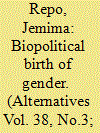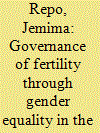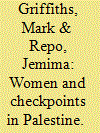| Srl | Item |
| 1 |
ID:
122995


|
|
|
|
|
| Publication |
2013.
|
| Summary/Abstract |
This article argues that gender was invented in the 1950s as a new sexual apparatus of biopower. Through a reading of mid-century sexological studies against the background of structural-functionalist and behaviorist theories of social order, it shows how gender was born in the clinic to discipline the reproduction of life in new ways. The truth of sex was no longer found in the genitals or mind, but in the contingent cognitive processes of a behavioral control system. The gender apparatus produced systematized protocols for sex reassignment surgeries for infants with ambiguous genitalia and rendered the family a panoptic institution, all to ensure that children were socialized into normative gender roles guaranteeing the continued reproduction of the life of the species. The violence of this new life-administering technology was crystallized in the pedagogical techniques employed by physicians designed to persuade their child patients to submit themselves to the normalizing care of surgeons and psychiatrists.
|
|
|
|
|
|
|
|
|
|
|
|
|
|
|
|
| 2 |
ID:
112871


|
|
|
|
|
| Publication |
2012.
|
| Summary/Abstract |
It is generally accepted amongst demographers that a declining fertility rate has negative economic consequences, namely in the guise of a slowdown in economic growth. Declining fertility has, therefore, been seen as a major problem in Japan and the EU for the last 20 years. Over the past two decades, demographers and social scientists have discussed intensely the causal connection between gender equality and female fertility, to the extent that during the past 10 years, gender equality has become the cornerstone of the EU and, to a degree, Japanese public policy aiming to re-optimise fertility rates. This article scrutinises the different ways in which gender equality is erected by demographic and social scientists in Japan and the EU as a technology of governance with the aim of re-exerting control over sexual reproduction. I argue that in the EU, scientists engage directly and endeavour to develop demographic theory based on European case studies, whereas Japanese gender equality policy is developed mainly by measuring the successes of European gender equality policy and considering the results it might yield in Japan. In both cases, however, gender equality is taken up as a tool for the governance of fertility.
|
|
|
|
|
|
|
|
|
|
|
|
|
|
|
|
| 3 |
ID:
178343


|
|
|
|
|
| Summary/Abstract |
The objective of this article is to bring Palestinian women to the centre of a discussion about the gendered dimensions of Israel’s convoluted permit system and checkpoint security infrastructure. Drawing on fieldwork close to one of the largest checkpoint terminals in the West Bank, Checkpoint 300 between Bethlehem and Jerusalem, the article develops knowledge about checkpoints in three important ways: i) as gendered spaces that regulate women’s mobility differently from that of men; ii) as spaces that produce particular embodied experiences for women; and iii) as security mechanisms that disrupt and regulate relations of care. This knowledge builds towards the main argument of the article: Palestinian women’s lives are profoundly affected by Israel’s imposition of permit systems and checkpoints in terms of highly gendered impositions of (im)mobility, embodied experience and relations of care. The research presented here thus makes two wider contributions to research on security to do with how the checkpoint brings the politics of gender and occupation to the fore, and how security infrastructure connects to the politics of care under military occupation.
|
|
|
|
|
|
|
|
|
|
|
|
|
|
|
|